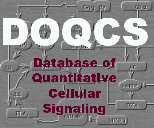
|
Links to other resources for databases and
simulators of signaling pathways
Some of these entries have been
borrowed from the computational
cell biology project at the University of Cambridge.
Computational cell biology resources
SCIENCE's
Signal Transduction Knowledge Environment Large resource for
signal transduction, needs subscription for full access.
TRANSPATH
signal transduction database Maps of signal transduction
pathways.
CSNDB:
Cell Signaling Networks DataBase Cell Signaling Networks Data
base (CSNDB) is a data- and knowledge- base for signaling pathways
of human cells.
Biomelecular
Interaction Network Database The Biomolecular Interaction
Network Database (BIND) is a database designed to store full
descriptions of interactions, molecular complexes and pathways.
Development of the BIND 2.0 data model has led to the incorporation
of virtually all components of molecular mechanisms including
interactions between any two molecules composed of proteins, nucleic
acids and small molecules.
WIT
Metabolic reconstructions for sequenced (or partially sequenced)
genomes
Cytocom
Network A network of laboratories working on signaling and
analysis.
DIP:
Database of Interacting Proteins The DIP(TM) database catalogs
experimentally determined interactions between proteins.
BioCarta
The BioCarta site has a Pathways section with many good-looking
pathway diagrams and some annotations for each.
SigPath
This is a developing site on quantitative signaling. "SigPath
is an information system designed to support quantitative studies on
the signaling pathways and networks of the cell."
E. coli databases
GenProtEC
E. coli Genome and Proteome database
CGSC
E. coli Genetic Stock Center
EcoCyc
Encyclopedia of E. coli Genes and Metabolism
ECDC
E. coli database collection
Colibri
Enzyme databases
NC_IUBMB
The Nomenclature Committee of the International Union of
Biochemistry and Molecular Biology has an exhaustive database of
enzymes and their nomenclature.
KEGG
Kyoto Encyclopedia of Genes and Genomes.
DBGET/LinkDB
Integrated database retrieval system of the GenomeNet, Japan.
BRENDA
BRENDA is a collection of enzyme functional data available to
the scientific community.
AfCS The
Alliance for Cellular Signaling has databases of molecules involved
in signaling, a listing of relevant proteins proteins and signaling
maps.
Cell biology modeling and specification language projects
CellML
The CellML markup language for signaling pathways, anatomy, and many
more aspects of cell biology.
ERATO/SBML
Systems Biology Workbench
Simulators for signaling pathways.
Kinetikit
version 7
This is the standard release for the kinetikit
simulator. The release includes the kinetikit source scripts and the
binaries for Linux for the GENESIS simulator.
Kinetikit
version 8 (Developmental)
This is the developmental release
for the kinetikit simulator. The release includes the kinetikit
source scripts and the binaries for Linux for the GENESIS simulator.
This version handles high-level specification of pathway
interactions but its format is planned to be superseded soon. If you
do not use the high-level specification stuff it is provides several
features beyond kinetikit 7. It requires a custom version of
genesis, which is part of the release.
GENESIS
This is a mirror of the official release of GENESIS.
Biospice
A biological data analysis and modeling workspace and database
DBsolve
Software for metabolic, enzymatic and receptor-ligand binding
simulation
E-Cell
A simulation platform for the modelling of cells at a molecular
level
Gepasi
A software package for modelling systems of biochemical reactions
Jarnac
A language for describing and manipulating cellular system models
MCell
A general Monte Carlo simulator of cellular microphysiology
Triple-J
Java web simulation project A Java/Mathematica simulator and
database of metabolic and oscillatory biochemical models.
Virtual
Cell A general computational framework for modeling cell
biological processes
WIT Metabolic
reconstructions for sequenced (or partially sequenced) genomes
Running models on-line. (To be implemented)
This forthcoming feature will initially allow predefined signaling
models in the database to be loaded and run. Subsequently it will be
extended to allow construction of the model on-line as well. The
Virtual Cell site already
allows this kind of on-line model definition and simulation.
| Database compilation and code copyright (C) 2022, Upinder S. Bhalla and NCBS/TIFR
This Copyright is applied to ensure that the contents of this database remain freely available. Please see FAQ for details. |
|
